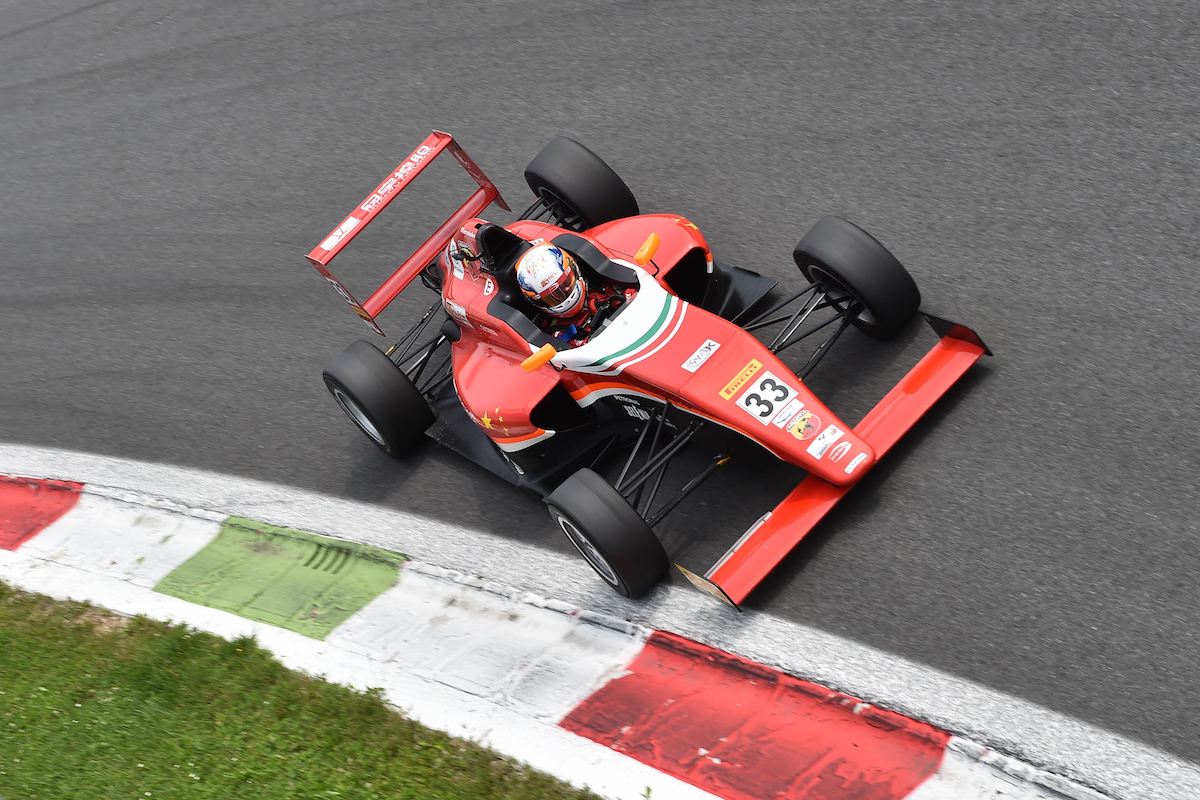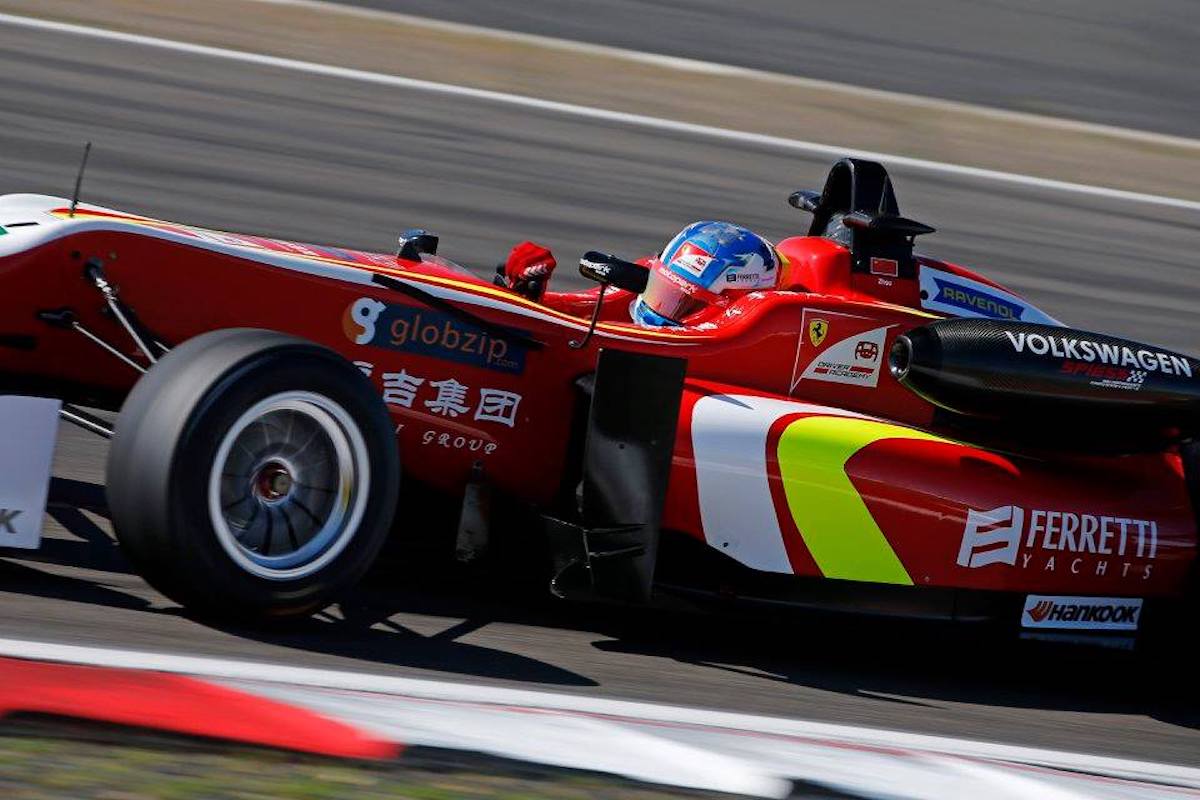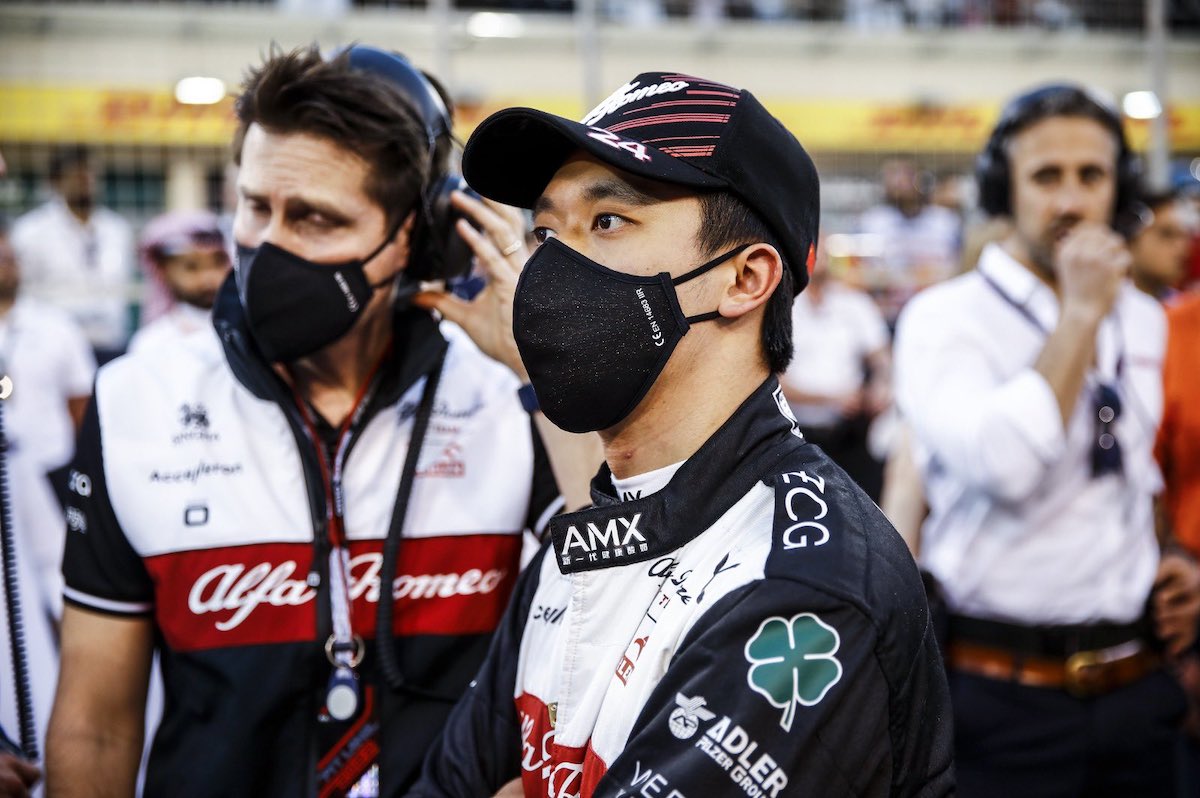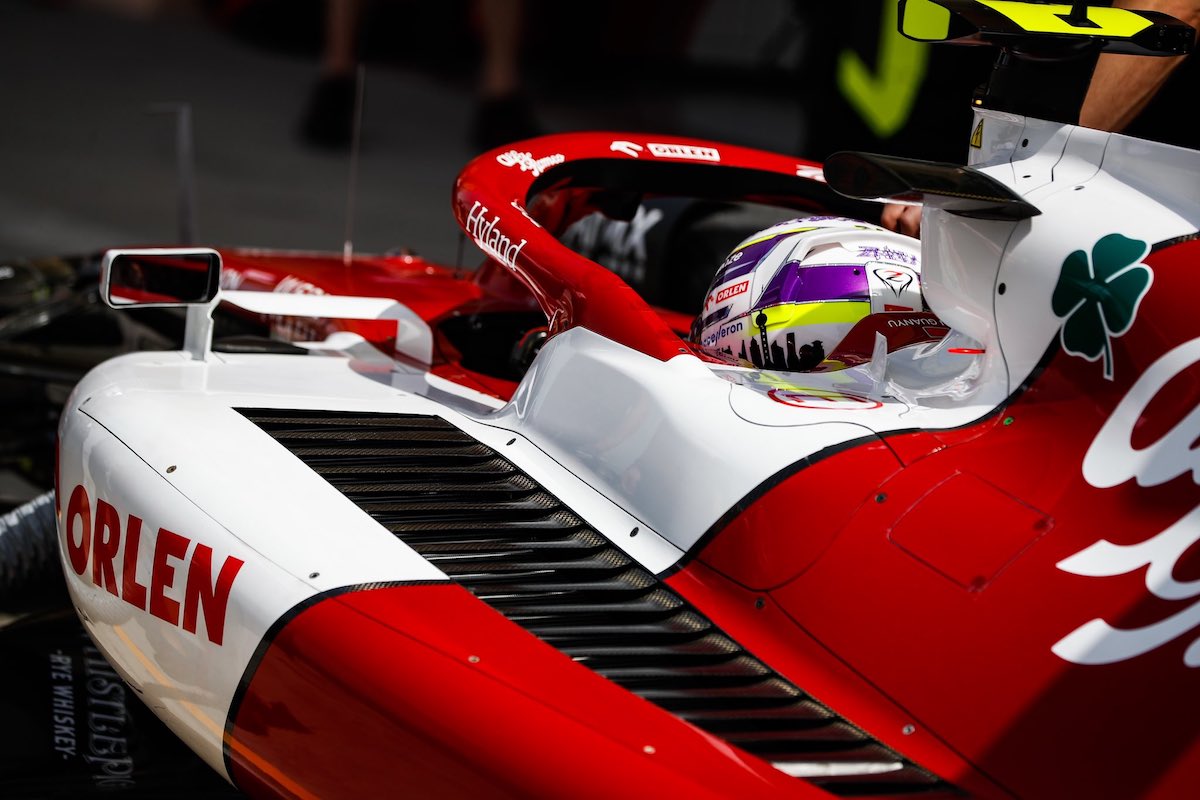
Photos: Sauber Group
By scoring a point on his debut, F1 2022’s only rookie continued a trend he showed on his way up the single-seater ladder. But there’s a part of that trend he now needs to avoid repeating, as Peter Allen explains
Guanyu Zhou is now officially a Formula 1 racing driver – and now officially known as Zhou Guanyu as he begins life in a championship that is evidently far keener to capitalise upon his nationality than the junior series in which he learnt his trade.
While the expectations and excitement around the only rookie on the 2022 grid are probably quite high back home in China, they have been rather modest elsewhere. That’s natural with a driver who ‘only’ finished third in Formula 2 last year in his third season in the category, behind two drivers with less experience in the championship. It’s impossible to look at Zhou’s place in F1 outside of the context of Oscar Piastri missing out, because that’s exactly the context in which it has come about. But Zhou, like pretty much any driver, deserves every chance to prove that he belongs.
His debut in Bahrain last weekend was certainly a positive first step in that regard. Expectations were low, but it would be fair to say that Zhou did well to exceed them nonetheless. Reaching the second phase of qualifying was already better than most would probably have predicted: if you were to pick the five drivers most likely to fall at the first hurdle, the sole debutant would surely have been among them and especially when he’s driving for a team that has been a common fixture in the drop zone in recent times.
The same is true of him scoring a point in the race. It’s not something many would have forecasted even after qualifying, and certainly not before the weekend had begun. Zhou didn’t hide his own delight and surprise at both results, and rightly so.
“I am so happy, I am speechless,” he said. “My biggest dream was to race in F1, then to score points and tonight we did both: being on the grid before the race, with the other 19 drivers, was crazy enough, but the race itself was so intense. It wasn’t so physically, but rather mentally: I had an issue at the start, the car went into anti-stall at turn one and then I knew I would have to do something special to recover to the top 10.”

There are, obviously, several factors that made those results easier for him to achieve than might have been anticipated in advance. The Alfa Romeo team has clearly come out of the blocks with a strong package for the new regulations, evidenced by Valtteri Bottas qualifying and finishing sixth. That meant Zhou had better equipment to get into Q2 and finish in the points than many, in particular those driving for Mercedes engine customers McLaren, Aston Martin and Williams. In the race, the late retirements for three of the four Red Bull entries further eased his path.
Still, the Alfa did not look quite as strong as Ferrari-powered counterpart Haas considering the way Kevin Magnussen jumped in at short notice and beat Bottas to fifth in both qualifying and the race, and yet Zhou was able to get the better of his old Formula 3 team-mate and rival Mick Schumacher in the second Haas to finish 10th – repassing him on fresh tyres having already been ahead prior to the late safety car.
Bahrain gave us an idea, but judging where each team truly sits in the pecking order with their new cars will remain unclear for a while, especially given the rapid rate of development that’s expected. That means team-mates will be used to benchmark drivers even more than usual and in Bottas, Zhou has a very tough benchmark indeed.
In Q2, Zhou was the best part of two seconds adrift, although if he hadn’t fallen foul of the stricter track limits enforcement and had his best time deleted, that gap would have been a more respectable 0.8 seconds. In the race, clutch issues led both Alfas to fall backwards at the start, but Zhou then appeared able to keep up with Bottas impressively well through traffic, even if a gap had opened up by the finish.
But arguably more impressive than Zhou’s results or his speed was his composure across a weekend that didn’t feature any of the typical ‘rookie errors’ that so often mar a driver’s debut in the big league. There were elements that helped him in that regard, but it was overall a positive debut and one Zhou probably came out of with more credit than he went into it with.
Belying a lack of experience to quickly get up to speed after stepping up to a new category is nothing new for Zhou, though. In many ways it was not a surprise, because it was something he’s made a habit of in his junior single-seater career.

Photo: ACI Sport
Even in Formula 4 as a newcomer to car racing, Zhou was almost immediately successful. OK, his actual debut came in a one-off Winter Trophy held at Adria where he scored a brace of third places from a modest 10-car field. Then his first full year of racing started with an ADAC F4 round at Oschersleben where he struggled. But when his main programme in the Italian championship got underway, he scored a pole position in the first round at Vallelunga, though team-mate Ralf Aron – with a year’s car racing under his belt – won the two main races. In round two at Monza, Zhou won all three races.
But it was in Formula 3 and Formula 2 where Zhou’s tendency to adapt quickly stands out from his seven-year junior single-seater career.
The decision for him to move into the FIA F3 European Championship after only one year in F4 was a surprise, especially as it wasn’t possible for him to remain with Prema, joining Motopark instead. Grid sizes were down from the excesses of the previous years, standing at a more reasonable 21 for the opening round, but this was still a very competitive series – and one without reversed grids, too.
But Zhou still made the podium in just the second race at Paul Ricard, the first rookie to do so that season. He was on it again in the next round at the Hungaroring. That weekend was dominated by rookies, but Zhou had at least started off just as competitively as team-mate Joel Eriksson and his former team-mate Aron.
Three seasons elapsed in European F3 before Zhou made the move up to F2 for 2019. But this was still a big step up and a relatively unusual one, bypassing GP3 (or the FIA F3 Championship as it became that year) and the experience it would have provided of the Pirelli tyres and other intricacies of racing on the F1 support bill.

Photo: FIA F3 Europe / Suer
Zhou’s rookie season didn’t show any ill effects from that, though. His impact was not quite as instant in results terms as it had been in F3, although 10th in his first feature race and fourth in his first sprint in Bahrain was still impressive, especially in terms of race pace considering he’d qualified 17th. It only took until round three at Barcelona for him to finish on the podium (in a feature race, which he led, no less) and until the mid-season trip to Silverstone to claim a pole position, and he ended the year as the highest-scoring rookie in seventh overall.
His early F2 form exceeded his own expectations, as he told Formula Scout at Silverstone the day before taking pole.
“The expectation was just scoring OK points in the beginning and trying to step on the podium in the end of the season, but we’ve done that already in round three,” he said. “We knew we had the pace but the race is different. I’m just happy that I’m getting used to the racing quite quickly, also the car. I’m still learning the tyres each race, because the tyre management is always the key for the races, but so far, so good.”
His team boss, Virtuosi Racing co-owner Andy Roche, also admitted to being positively surprised. “The target was possibly a win or a podium in race two this year,” he said a couple of rounds later. “We’ve exceeded that very early in the year. He just needs a win under his belt now, and I think it’s coming. It’s just tyre management really. There’s not much to come, a little tweak and it will come very quickly.”
Roche engineered future grand prix winners Juan Pablo Montoya and Mark Webber in F2 forerunner International F3000, and pointed to Zhou’s ability to learn quickly as a key strength.
“Everything he hears or sees, he soaks it all up and he can act on it,” he said. “A lot of drivers, it doesn’t compute, it gets forgotten, whereas he will work and work and work until he gets it, and I think that’s going to be his strength. He learns so quickly, and once it’s learnt once, it’s learnt, it doesn’t get forgotten, and that will be a strength for him for sure.”

Photo: Jerry Andre / LAT / FIA F2
The ability to adapt quickly to faster machinery – whether it’s in debut tests or early races – is a key indicator of potential in young drivers as they progress up the ladder. It’s a skill that’s marked out the likes of Charles Leclerc and George Russell, both race winners on their debut F3 weekends together at Silverstone in 2015.
A caveat over Zhou in this regard is that his funding has allowed him plentiful testing compared to some of his rivals before he’s made his debut in a particular category – even in F1, where he has benefited from extensive private running across the past two years with Renault/Alpine. But it would be unfair to put his impressive rookie season performances down to that alone, just as it would be with Lando Norris.
Where the doubts lie with Zhou in contrast to F1’s top-rated young stars is in the other trend that stands out from his junior career: His struggle to kick on from those early signs of promise and continue striding forward as he gains more and more experience.
This too arguably goes right back to the start of his career in cars, for his aforementioned round two hat-trick at Monza was not followed by any further victories, even though second place in the final standings was a respectable enough result.
Then, in F3, his two podiums in the first two rounds were not followed up by any more trips to the overall rostrum that season, while his rookie team-mates Eriksson and Niko Kari went on to win a race each and finish ahead in the standings. That’s not to say his first season as a whole as a disappointment, but a return to the Prema fold for his second season didn’t lead to the marked improvement you might expect. OK, so this was a year in which the team’s lead drivers Maximilian Gunther and Callum Ilott were beaten in the title race by Carlin’s Norris and Motopark’s Eriksson, but Zhou never looked to be in their league.

Photo: FIA F3 Europe
Staying with Prema for another season in 2018 did bring an obvious step forward in performance, with Zhou breaking his win duck in the season-opening race in Pau before claiming pole positions at Zandvoort and Spa – at which point he was only one point off the championship lead and on more than twice the points of eventual champion Schumacher.
But Zhou was taken out of that Spa race by early contact with Schumacher, who went on to claim his first win. He struggled through the next few rounds, as did team-mates Aron and Marcus Armstrong, while Prema’s other drivers Schumacher and Robert Shwartzman suddenly hit top form. A return to the top step in the final round at Hockenheim wasn’t enough to stop Zhou finishing eighth in the standings for the second year in a row, albeit with a greater points tally.
In F2, Roche was hardly the only one convinced that Zhou’s first win must be around the corner as his rookie campaign moved into its second half. That it didn’t wasn’t a huge deal, but it set a clear target for him once the 2020 season finally got underway in Austria in July that year. In cars nobody had driven since pre-season testing four months earlier, Zhou laid down a marker by qualifying on pole by almost half a second and looked well on his way to that breakthrough victory in the feature race only to suffer a mechanical failure.
His season never recovered from that disappointment. While new team-mate Ilott began to set the pace and that man Schumacher put on another late charge to snatch the title, it wasn’t until a shortened sprint race in round 10 of 12 in Sochi that Zhou finally got his first win. Sixth in the standings was only one place and 11.5 points better than 2019.
Zhou started his third season in F2 how he started his third in F3, by taking a big win first time out (in the Bahrain feature race) and leading much of the early running in the championship fight. But just as in F3, several incidents in the middle of the year cost him ground – and unlike in F3, this time they were mostly his fault, like his spins on lap one of Silverstone race one and on his way to the grid of the opener in Sochi. His qualifying form also slipped slightly – not by a lot, but enough to make a difference when Piastri was starting an unbeaten streak of pole positions converted into feature race wins.

Photo: Formula Motorsport Limited
Finishing third in the points was perhaps the best that was possible for a Virtuosi driver against an increasingly strong Prema attack, but some high-profile slip-ups didn’t help the general perception that Zhou had not maximised everything in his control. And it was general perception that he most needed to win over once Alfa Romeo and the Sauber company that operates its F1 team was convinced to take him on.
It was perhaps significant that it was Schumacher that Zhou got the better of in their fight to score a maiden F1 point, because they are perhaps polar opposites as drivers based upon their junior single-seater careers – where they were often competing against each other. Schumacher’s tendency to struggle in a rookie season before making a big step forward in his second year has already been well-chronicled, while the evidence is that Zhou gets quickly up to speed as a rookie but stagnates rather thereafter.
If the Haas and the Alfa Romeo cars are going to remain closely matched this season, the contest between F1 sophomore Schumacher and newcomer Zhou could be particularly interesting to watch. Both have some work to do to convince their doubters that they are good enough to have the long F1 careers that their commercial attractiveness could guarantee them – especially if they remain on the grid while the likes of Piastri and potentially Theo Pourchaire (should he do the job in F2 this season) are frozen out.
But while Schumacher is now into his second season in F1, and therefore would be expected to start unlocking his potential, he is having to drive a completely new car after the overhaul of the technical regulations for 2022. To a degree, F1 drivers have to be able to adapt to a new car every single season, but the philosophy and driving style of those cars usually remains similar from one year to the next – so long as you don’t move teams. That’s not the case for Schumacher this year, though, creating a more level playing field between him and rookie Zhou. And perhaps what we saw in Bahrain was the same tendency from their junior careers for Zhou to be the faster out of the box.

Now Zhou needs to kick on, something that’s not going to be easy with the benchmark that will be set for him by Bottas. Bahrain provided a very familiar environment for him to make his debut, with a track he’s started nine F2 races on before and conducted numerous tests at across F2 and F1, but he’ll face new challenges in the coming weeks like Melbourne’s Albert Park, a place with a reputation for being unkind to F1 debutants.
We don’t exactly have to look too hard to see that scoring points on an F1 debut in Bahrain doesn’t necessarily lead to a great first campaign. Yuki Tsunoda was labelled “the best rookie F1 has had for years” by none other than Ross Brawn after finishing ninth in Bahrain one year ago, but a crash in qualifying for the next round at Imola was the beginning of a tough period for the AlphaTauri driver.
Zhou will be keen to avoid that and one thing he has in his favour is vastly more experience compared to Tsunoda, who was fast-tracked from F4 to F1 in a little over two years with only a few months of F1-specific preparation.
But it won’t take much for the pressure to ramp up like it did on Tsunoda last year, and how Zhou will deal with that is still a major question mark. How much has pressure played a role in the trends of his career so far, when he’s surpassed the modest expectations of his rookie campaigns and then not lived up to what was expected after that?
He has admitted that the pressure did get to him in F2 last year when there were an increased number of eyes on his performances amidst talk of him going to F1. He’s been well aware of those criticising him and keen to prove them wrong, and saying there will be less pressure now he’s in F1 seems optimistic.
For now, expectations on Zhou are certainly lower than when he was being touted as an F2 title favourite, but how he handles the pressure that is bound to come might just define whether he can this time make the most of the potential that’s long been clear.

Further reading
Who was really the fastest driver in F2 2021?
Five young drivers Alfa Romeo should support in its Stellantis era (July 2021)
The F2 juggernauts who adopted each other’s strengths in 2021
Why East Asia struggles to produce F1 drivers (July 2018)